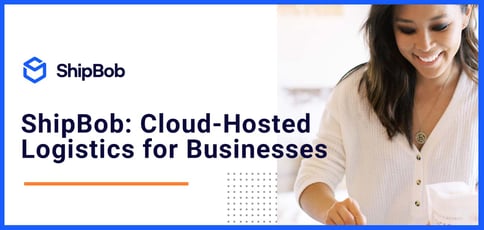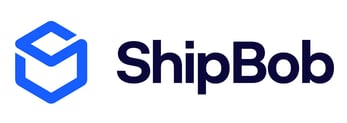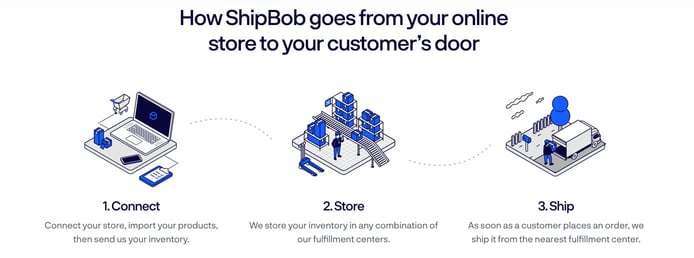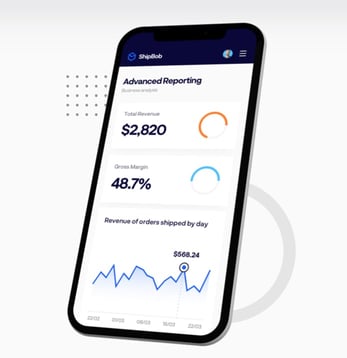
TL; DR: ShipBob provides ecommerce logistics support services that help small to midsize merchants fulfill online orders. The company’s proprietary cloud-based software platform works in concert with its wide network of fulfillment centers, mostly throughout the U.S. The company’s platform includes management and monitoring tools that give its merchant users real-time process visibility as their goods travel from warehouse to consumer within two days. ShipBob’s market strategy is also dynamic and its roadmap is shaped by a robust feedback loop.
Despite the global COVID-19 pandemic, ecommerce is experiencing a boom. According to Digital Commerce 360, online spending represented 21.3% of total retail sales in 2020 — more than $861 billion. Pandemic-related boosts in online shopping resulted in nearly $175 billion in ecommerce revenue — a figure that likely would not have been reached until 2022, the report found.
That sounds like welcome news for online businesses, but sudden surges in demand also present challenges for small to midsize ecommerce firms. Not only must they ensure their supply chain can cope with extra orders, but they also have to find resources to address the logistics and fulfillment side. That can eat into core business planning time.

ShipBob helps those businesses quickly scale their logistics operations. Its cloud-hosted logistics platform integrates with a global network that includes many dedicated fulfillment centers throughout North America.
Typically, ShipBob customers are small to midsize ecommerce businesses that need an alternative to the more commoditized fulfillment options offered by other online retail ecosystems.
From a software perspective, ShipBob provides merchants with a single view of their retail activities across all sales channels. It also enables them to manage products, inventory, orders, and shipments, and to leverage analytics and reporting tools to keep operations on track.
Ecommerce startups often overlook the importance of fulfillment, but consumer expectations today are higher than ever. Rather than expecting deliveries to be slower during the COVID-19 pandemic, homebound consumers opted to place orders with online retailers that deliver quickly — typically within two days. Consumers increasingly make delivery speed a top priority when ordering products online, according to a NielsenIQ study.
ShipBob’s turnkey integrations with leading ecommerce platforms and marketplaces — including Amazon, Shopify, and Wix — help speed deliveries along. Merchants that use those platforms can import orders, send, and receive data for a two-way information flow.
ShipBob’s streamlined four-stage fulfillment model is optimized to simplify complexity, according to Kristina Lopienski, Director of Marketing Communications.
“Connect your store and send us your products,” Kristina said. “Next, we store your inventory securely in our fulfillment centers. Then, when your customer places an order on your store, we pick, pack, and ship the order to your customer.”
Solutions to Logistics Dilemmas That Hobble Ecommerce Startups
ShipBob’s merchant customers have realized that struggling to manage fulfillment in-house takes time away from strategizing business growth.
“You cannot develop your ecommerce brand effectively if you are picking orders and packing boxes yourself,” Kristina said. “Most small to midsize businesses are time-constrained. While you may think you will save money with a DIY approach, it holds you back from focusing on the things that only you, the business owner, can do — including product development and brand marketing.”
The dilemma is compounded by the fact that, as soon as business owners find time for growth-focused activities, they have to focus on fulfilling new orders as they come in.
ShipBob’s service portfolio is based on a straightforward and transparent pricing structure.
Pick and pack services are cost-free for the first four picks in an order, then 20 cents for the fifth pick and each one thereafter. Standard packing includes plain boxes, mailers, tape, and dunnage used to pack orders. Merchant clients can also request quotes from the ShipBob website.
Proprietary Software Provides Greater Flexibility and Scalability
ShipBob launched in 2014 as part of an ecommerce company run by its founders — Dhruv Saxena (CEO) and Divey Gulati (COO). When their ecommerce operation started to do well, they kept running into the same problem: The more orders the business received, the more time the two partners spent shipping items out, and the less time they had to grow their business.
From its inception, ShipBob has deployed proprietary cloud-hosted software across its fulfillment network. Even in 2014, that approach distinguished it from many competitors. Building that IT model called for a significant initial investment in core technology.
However, Dhruv and Divey knew that a custom software build would give them control over their platform’s flexibility and scalability — which are its most compelling attributes.

“This gives ShipBob a lot of in-house control. It allows us to move quickly when we want to make changes,” Kristina said.
Each component of its cloud fulfillment service was developed from scratch. That includes order management, inventory, reporting, customer experience monitoring, and returns management.
Merchants can add supplementary ecommerce tasks from ShipBob’s apps marketplace to provide a single solution to track broader business requirements.
ShipBob uses its proprietary Warehouse Management System in all of its fulfillment centers, meaning it takes less time to get new facilities up and running.
Analytics Reporting Gives Merchants Extensive Process Visibility
ShipBob’s support package acknowledges the importance of monitoring purchase patterns and predicting demand needs, informed by the data it hosts.
“At ShipBob, we believe data can be a competitive advantage for direct-to-consumer brands,” said Kristina. “Recently we launched a free-to-use Analytics Reporting Tool (ART) packed with new charts and deeper insights to help merchant users with everything from year-end reporting to better supply chain optimization and decision-making.”

Other bundled ART metrics include fulfillment performance, shipping insights, demand forecasting, and cost monitoring.
“ShipBob’s ART provides data and insights that you cannot source anywhere else,” Kristina said. “Whether it’s optimizing a brand’s ideal inventory distribution based on their historical order data, or visualizing when they will run out of inventory if demand shifts, it’s full of revealing information that gives brands the data they need to make best business decisions.”
While the ShipBob platform has a robust tool set, its core purpose is to help ecommerce brands scale effortlessly. That includes assisting companies with expansion into new fulfillment centers and international marketplaces, and processing orders quickly, even if a merchant’s order volume triples overnight.
“That happened with some products related to the pandemic, and it’s achievable without them having to reallocate resources away from business management to oversee the increased fulfillment,” said Kristina.
ShipBob also includes features that allow merchant users to monitor their own operational KPIs, so they can compare the service provider’s actual performance against its agreed SLA commitments.
A Service Platform Built on User Feedback
ShipBob’s full-stack approach allows its software engineers to develop a technology roadmap based on the direct feedback from its merchant user community.
“We continuously ask for feedback on how we can improve and support our customers, and we can react quickly,” Kristina said. “ShipBob develops its product roadmap based on the direct feedback from our customer community — not on what it thinks the community might want.”
That responsiveness also informs the company’s approach to its rollout in new locations. In 2021, it opened fulfillment centers in Australia and the UK. Customer feedback garnered at its Product Advisory Council events partly guides those decisions.

ShipBob leverages its position as a host to an industry information hub by connecting its merchant user community to exchange advice and information on best practices. That responsibility was given greater significance when the COVID-19 pandemic began.
Between March and May 2020, ShipBob hosted a weekly webinar series called Moving Your Business Forward, Kristina said.
“Each week, we featured contributions from a diverse selection of leading brands across verticals to hear how they were adjusting to the new trading conditions and to answer COVID-19-related ecommerce questions from the online audience,” she said. “It served as an opportunity for brands to share COVID-19 and ecommerce advice on how to run a long-term business at a time of uncertainty.”
ShipBob: Focused on Customers, Not Competitors
Given the correlation between social distancing and ecommerce, it is not surprising that ShipBob has seen substantial growth since the COVID-19 pandemic began. And the company now works with more than 5,000 ecommerce brands.
It has been backed by several funding rounds, most recently $200 million of Series E financing. After a strong 2020, it is looking to double its growth in 2021 for a second consecutive year.
The company remains confident that delivery volumes will sustain the justification for further point-of-presence expansion into global territories. There’s also the question of last-mile logistics as consumer preferences foreshorten ecommerce delivery times even further.
“Our Co-Founder Dhruv Saxena talks about how we are customer-obsessed, not competitor-obsessed,” Kristina said. “That is a telling distinction. It means that everything ShipBob builds is informed by many hours of conversations with our merchant users. ShipBob aims to be creative in building new feature sets to solve customer pain points. This we do regardless of where –— or who — our competition may prove to be.”
HostingAdvice.com is a free online resource that offers valuable content and comparison services to users. To keep this resource 100% free, we receive compensation from many of the offers listed on the site. Along with key review factors, this compensation may impact how and where products appear across the site (including, for example, the order in which they appear). HostingAdvice.com does not include the entire universe of available offers. Editorial opinions expressed on the site are strictly our own and are not provided, endorsed, or approved by advertisers.
Our site is committed to publishing independent, accurate content guided by strict editorial guidelines. Before articles and reviews are published on our site, they undergo a thorough review process performed by a team of independent editors and subject-matter experts to ensure the content’s accuracy, timeliness, and impartiality. Our editorial team is separate and independent of our site’s advertisers, and the opinions they express on our site are their own. To read more about our team members and their editorial backgrounds, please visit our site’s About page.



